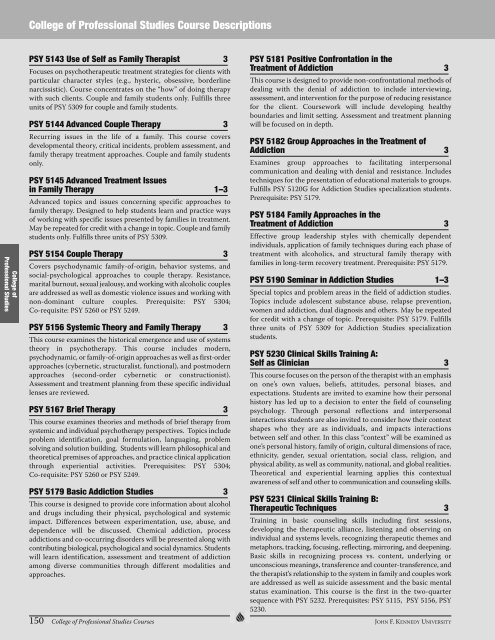Business Administration - John F. Kennedy University
Business Administration - John F. Kennedy University
Business Administration - John F. Kennedy University
You also want an ePaper? Increase the reach of your titles
YUMPU automatically turns print PDFs into web optimized ePapers that Google loves.
College of<br />
Professional Studies<br />
College of Professional Studies Course Descriptions<br />
PSY 5143 use of Self as family Therapist 3<br />
Focuses on psychotherapeutic treatment strategies for clients with<br />
particular character styles (e.g., hysteric, obsessive, border line<br />
narcissistic). Course concentrates on the “how” of doing therapy<br />
with such clients. Couple and family students only. Fulfills three<br />
units of PSy 5309 for couple and family students.<br />
PSY 5144 advanced Couple Therapy 3<br />
recurring issues in the life of a family. This course covers<br />
developmental theory, critical incidents, problem assessment, and<br />
family therapy treatment approaches. Couple and family students<br />
only.<br />
PSY 5145 advanced Treatment issues<br />
in family Therapy 1–3<br />
Advanced topics and issues concerning specific approaches to<br />
family therapy. designed to help students learn and practice ways<br />
of working with specific issues presented by families in treat ment.<br />
May be repeated for credit with a change in topic. Couple and family<br />
students only. Fulfills three units of PSy 5309.<br />
PSY 5154 Couple Therapy 3<br />
Covers psychodynamic family-of-origin, behavior systems, and<br />
social-psychological approaches to couple therapy. resistance,<br />
marital burnout, sexual jealousy, and working with alcoholic couples<br />
are addressed as well as domestic violence issues and working with<br />
non-dominant culture couples. Prerequisite: PSy 5304;<br />
Co-requisite: PSy 5260 or PSy 5249.<br />
PSY 5156 Systemic Theory and family Therapy 3<br />
This course examines the historical emergence and use of sys tems<br />
theory in psychotherapy. This course includes modern,<br />
psychodynamic, or family-of-origin approaches as well as first-order<br />
approaches (cybernetic, structuralist, functional), and post modern<br />
approaches (second-order cybernetic or constructionist).<br />
Assessment and treatment planning from these specific individ ual<br />
lenses are reviewed.<br />
PSY 5167 Brief Therapy 3<br />
This course examines theories and methods of brief therapy from<br />
systemic and individual psychotherapy perspectives. Topics include<br />
problem identification, goal formulation, languaging, problem<br />
solving and solution building. Students will learn philosophical and<br />
theoretical premises of approaches, and practice clinical application<br />
through experiential activities. Prerequisites: PSy 5304;<br />
Co-requisite: PSy 5260 or PSy 5249.<br />
PSY 5179 Basic addiction Studies 3<br />
This course is designed to provide core information about alcohol<br />
and drugs including their physical, psychological and systemic<br />
impact. differences between experimentation, use, abuse, and<br />
dependence will be discussed. Chemical addiction, process<br />
addictions and co-occurring disorders will be presented along with<br />
contributing biological, psychological and social dynamics. Students<br />
will learn identification, assessment and treatment of addiction<br />
among diverse communities through different modalities and<br />
approaches.<br />
PSY 5181 Positive Confrontation in the<br />
Treatment of addiction 3<br />
This course is designed to provide non-confrontational methods of<br />
dealing with the denial of addiction to include interviewing,<br />
assessment, and intervention for the purpose of reducing resis tance<br />
for the client. Coursework will include developing healthy<br />
boundaries and limit setting. Assessment and treatment planning<br />
will be focused on in depth.<br />
PSY 5182 group approaches in the Treatment of<br />
addiction 3<br />
Examines group approaches to facilitating interpersonal<br />
commu nication and dealing with denial and resistance. Includes<br />
tech niques for the presentation of educational materials to groups.<br />
Fulfills PSy 5120G for Addiction Studies specialization students.<br />
Prerequisite: PSy 5179.<br />
PSY 5184 family approaches in the<br />
Treatment of addiction 3<br />
Effective group leadership styles with chemically dependent<br />
individuals, application of family techniques during each phase of<br />
treatment with alcoholics, and structural family therapy with<br />
families in long-term recovery treatment. Prerequisite: PSy 5179.<br />
PSY 5190 Seminar in addiction Studies 1–3<br />
Special topics and problem areas in the field of addiction studies.<br />
Topics include adolescent substance abuse, relapse prevention,<br />
women and addiction, dual diagnosis and others. May be repeated<br />
for credit with a change of topic. Prerequisite: PSy 5179. Fulfills<br />
three units of PSy 5309 for Addiction Studies specializa tion<br />
students.<br />
PSY 5230 Clinical Skills Training a:<br />
Self as Clinician 3<br />
This course focuses on the person of the therapist with an emphasis<br />
on one’s own values, beliefs, attitudes, personal biases, and<br />
expectations. Students are invited to examine how their personal<br />
history has led up to a decision to enter the field of counseling<br />
psychology. Through personal reflections and interpersonal<br />
interactions students are also invited to consider how their context<br />
shapes who they are as individuals, and impacts interactions<br />
between self and other. In this class “context” will be examined as<br />
one’s personal history, family of origin, cultural dimensions of race,<br />
ethnicity, gender, sexual orientation, social class, religion, and<br />
physical ability, as well as community, national, and global realities.<br />
Theoretical and experiential learning applies this contextual<br />
awareness of self and other to communication and counseling skills.<br />
PSY 5231 Clinical Skills Training B:<br />
Therapeutic Techniques 3<br />
Training in basic counseling skills including first sessions,<br />
devel oping the therapeutic alliance, listening and observing on<br />
indi vidual and systems levels, recognizing therapeutic themes and<br />
metaphors, tracking, focusing, reflecting, mirroring, and deepen ing.<br />
Basic skills in recognizing process vs. content, underlying or<br />
unconscious meanings, transference and counter-transference, and<br />
the therapist’s relationship to the system in family and couples work<br />
are addressed as well as suicide assessment and the basic mental<br />
status examination. This course is the first in the two-quarter<br />
sequence with PSy 5232. Prerequisites: PSy 5115, PSy 5156, PSy<br />
5230.<br />
150 College of Professional Studies Courses JOHn F. KEnnEdy UnIvErSITy















